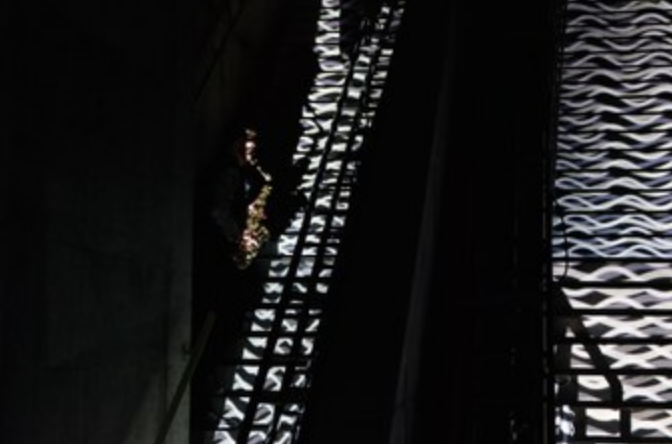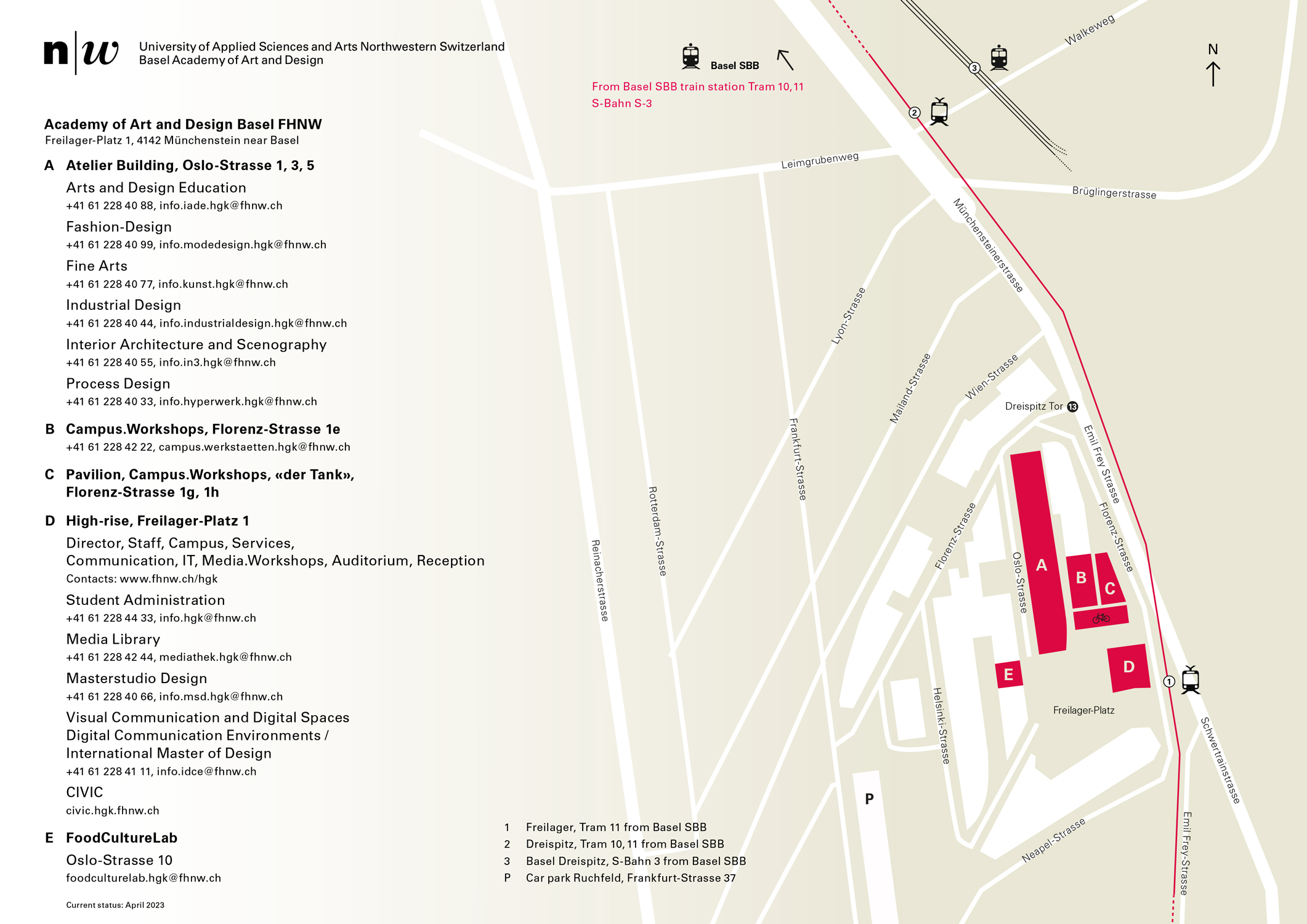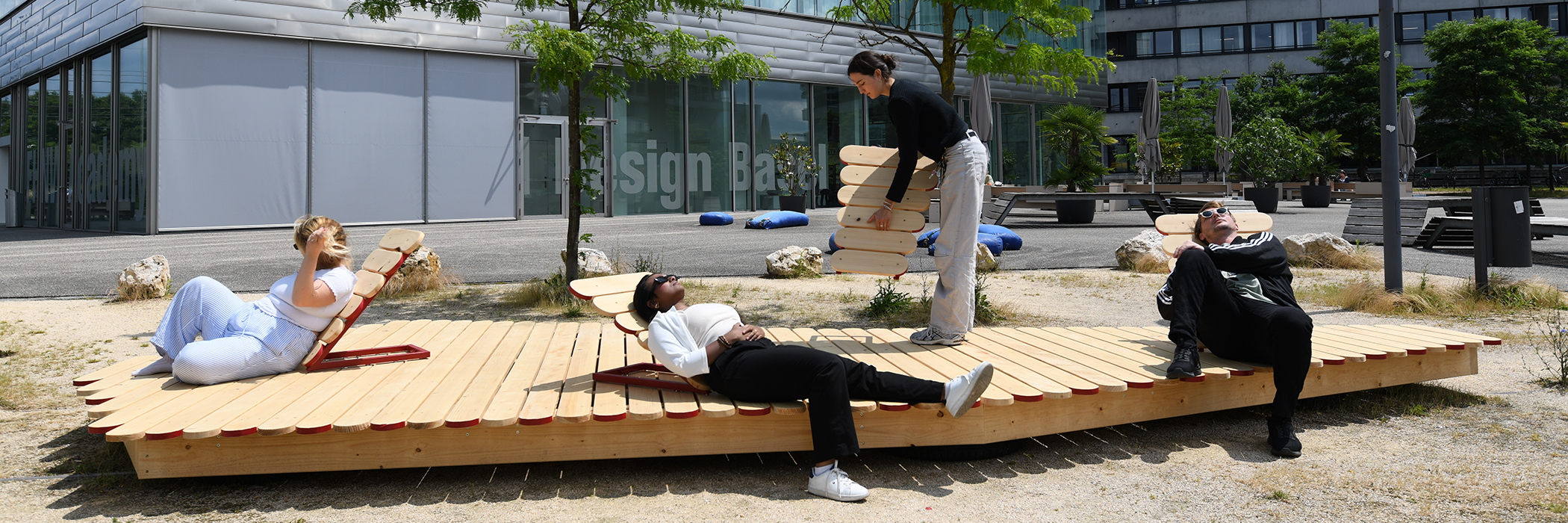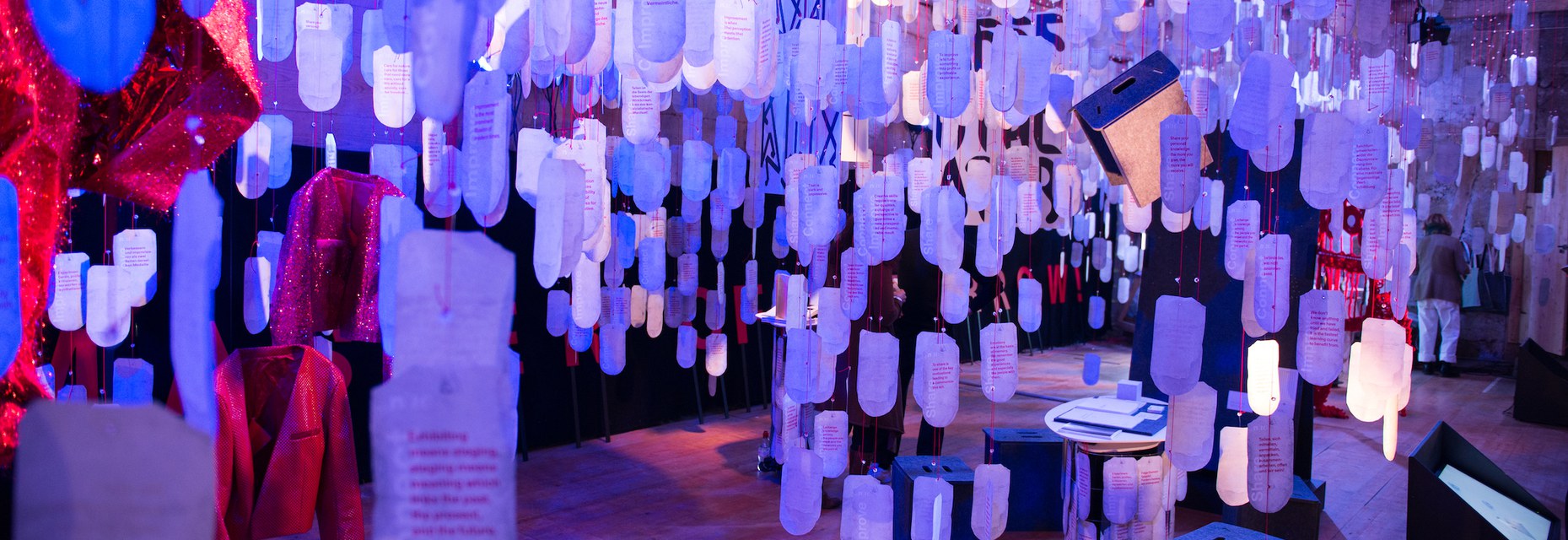Interior Architecture and Scenography BA
The degree programme offers a comprehensive education that prepares students to design urban spaces that are not only aesthetically pleasing, but also socially relevant and sustainable. At a time when spaces are increasingly perceived as integral components of social life and the public sphere, this degree programme provides the necessary knowledge and practical skills to create spaces that meet the demands of our present and future.
Key data
- Degree
- Bachelor of Arts FHNW
- ECTS points
- 180
- Study start
- September (week 38)
- Next start
- Mon. 14.09.2026 | Fall Semester
- Final application date
- Sun, 01.03.2026
- Studying mode
- fulltime
- Duration
- 6 Semester
- Teaching language
- German (B2 or equivalent)
- Place
- Basel
- Stay abroad
- possible
- Application fee
- CHF 200.- (incl. aptitude assessment and enrolment)
- Semester fee
- CHF 750 (CH); CHF 1.000 (EU); CHF 1.250 (Not-EU/EFTA) Fees detail
The application window has been extended until 1 March 2026.
Mobile navi goes here!
Information on programme contents
The degree programme focuses on how public urban spaces are designed in which social and political activities take place. How indoor and outdoor spaces interact and create collective meaning through their design, function and narratives.
The development of dramaturgical concepts for the spatial translation of stories in publicly accessible indoor and outdoor spaces, in stage design and in exhibitions, is at the centre of our scenographic spatial practice. The focus is on the examination of space, time, material, light, media and their effect on utilisation by the public.
Students deal with the design of sustainable, future-proof spaces that are closely linked to social processes, the coexistence of people and other actors as well as diversity and inclusion. These topics are jointly developed and discussed in practical, theoretical and research-based teaching units.
Bringing spaces to talk
In Interior Architecture and Scenography, you get to deal with all facets of space: with its dimensions, with the colour and material of its surfaces, with the lighting, as well as with the objects that structure its form. At the core of all considerations are human as well as non-human beings in their role as recipients and users, whom you directly address and involve through your approach and work. You analyse the functional relationships along with the communicative purposes of interior and exterior spaces, and conceptualize and plan time-limited as well as permanent changes to specific spaces. In exhibitions, you get the chance to make content-based themes spatially perceptible, cast exhibits in their right light, and underpin the dramaturgical sequences by means of sound and moving images. Within an architectural framework you create and plan spatial structures that reflect the site-specific and contemporary conditions.
Practical relevance and perspectives
Students engage in collaborations on a regular basis in order to test the actual applicability of models or plans, publicly and on a scale of 1:1. It is only when a design concept is published and implemented, either in a real exhibition, in a proposal for a specific outdoor design, in temporary lightings or pictorial projections, that the conceptual work carried out in the studio or workshop becomes verifiable. Whether it is in the realm of stage design, in exhibition design or in urban scenographies and interventions in the field of hospitality, work and corporate design, students are given the chance to engage critically with high and popular culture and participate in socially relevant discourses. The cross-disciplinary course programme equips students with a comprehensive range of skills – including new media and technologies – and prepares them for a wide scope of practical activities between architecture, interior design, scenography, and theatre.
Connecting to the theoretical discourse
Theoretical discourses interact with social discourses and changes in the design practice. In order to be able to critically contextualise and discuss your own work and position, you will be introduced to different design theory perspectives, knowledge and experiences. Through research-based teaching and learning approaches, the impressions gleaned from collaborating with various knowledge communities, local institutions and interest groups are conveyed and reflected upon in exchange.
Working in a collective
Whether during or after your studies, you will be dealing with professionals from the fields of architecture, theatre, film, fair construction, digital media and the arts, and with experts from a variety of other fields as well. Whatever the task, working as an interior architect or scenographer requires the ability to cooperate, which is why we place such emphasis on the team and communicative skills of our students and help to develop them in the course of their studies.
Interior Architecture and Scenography
Interior Architecture and scenography mutually enrich and reinforce each other. During your BA studies you are called upon to form your own impression and develop an individual approach to both fields before, according to your own skills and preferences, settling for either one or the other in the context of your BA thesis. Both disciplines deal with space from the perspective of the people who apprehend and use it. While scenography concentrates on the spatial composition and dramaturgy of timelines and narrations, interior architecture focuses on the atmospheric impact of space in due consideration of the optimization of functional and operational processes. As far as methodology is concerned all study projects are subject to the same sequence structure: from “research and analysis” to “concept and design”, and from “preliminary project” and “project” to “documentation”. The procedure reflects a combination of scenographic practice and architectural design appreciation.
Study structure
Foundation programme (1st and 2nd semester)
In the ‘Space’ and ‘Scenography’ workshops, you will explore space as a design field and try out various design methods. You will gain experience in dealing with spatial perception, atmosphere and design in context, as well as in presenting your results. You will also practice research techniques and train your argumentation skills in design practice.
In the field of theory, history and research, you will work on relevant creative, cultural and socio-political discourses and strengthen your critical thinking and acting skills through contextualisation, analysis, criticism and interpretation. As we often pursue a theory of practice, we work with applicable theories and, from the second semester onwards, in exchange with institutions in Basel.
Pre-thesis
After the foundation course, you take the pre-thesis, which tests your suitability for the main degree programme. It comprises of an individual design project as well as questions on the theoretical content of the first year of study.
Main study programme (3rd to 6th semester)
In practical projects, you will apply the knowledge you acquired in the foundation course and design interior and exterior spaces, exhibitions and stage sets. You will work on analysing, conceptualising, planning and documenting your projects, with selected designs also being presented to the public. You will choose one of two assignments per semester and deepen your knowledge in supplementary workshops.
Modules – Courses – Course Catalogue
Bachelor Thesis
The programme concludes with the theoretical and practical Bachelor's thesis. You apply the knowledge you have acquired during your studies. The thesis is presented to a jury, and successful completion of the programme leads to the title ‘Bachelor of Arts FHNW Interior Design and Scenography’.
Internships
The Bachelor's programme supports year-round internships in renowned offices or studios. An internship improves the chances of starting a career and is generally recommended. The internship year ideally takes place after the 3rd or 4th semester and extends the degree programme by two semesters.
Exchange semester
We support you with an exchange semester domestically or abroad, which is possible in the 4th semester. We have exchange agreements with universities in Europe and the USA. Two to three students from comparable universities are also accepted onto the Bachelor's degree programme in Interior Architecture and Scenography each semester.
- Akademie der Bildenden Künste, München (D), Interior design
- ArtEZ hogeschool voor de kunsten, Zwolle (NL), Interior design
- Beuth Hochschule für Technik, Berlin (D)
- Burg Giebichenstein Hochschule für Kunst und Design, Halle (D), Interior design
- Design Academy Eindhoven (NL), Architecture
- Diputació de Barcelona, Barcelona (ES), Institut del Theatre
- EINA, Centre Universitari de Disseny i Art, Barcelona (ES), Interior design
- Fachhochschule Münster (D), Architecture
- Fachhochschule Hannover (D), stage sets and costumes
- Fachhochschule Kaiserlautern (D), Interior design
- Fachhochschule Lippe und Höxter (D)
- Hochschule für bildende Künste, Hamburg (D)
- Hochschule für Gestaltung, Karlsruhe (D)
- Hochschule Coburg (D), Interior design
- Hochschule Wismar (D), Interior design
- Hogeschool Rotterdam (NL), Willhelm De Kooning Academy
- IEC College of Art & Fashion, Kathmandu (NP), Interior design
- Kunst- og designhøgskolen, Bergen (NO), Furniture and interior design
- Kunsthochschule Kassel (D), Product design
- Ecole nationale supérieure des arts visuels de La Cambre, Brüssel (BE), Scenography
- Muthesius Kunsthochschule, Kiel (D), Spatial planning/scenography
- Scuola Universitaria della Svizzera Italiana, Manno (CH)
- Shenkar College Tel Aviv (IL), Interiors and environment
- Tongji University Shanghai (CN)
- Universidad Veritas - Arte Diseño Arquitectura, San José (CR), Interior design
- University of Technology, Sydney (AU)
- Weissensee Kunsthochschule, Berlin (D), Stage sets and costumes/product design
- Züricher Hochschule der Kunst (CH), Theater: Specialization on scenography
Critical thinking, empathy, teamwork and communication skills are crucial for your advancement in the programme. You will work together with specialists from various disciplines such as architecture, dramaturgy, film and art. Teamwork, strong communication skills and independent, critical thinking are required in all tasks as future interior architects and scenographers.
Goals and benefits
The interdisciplinary degree programme provides you with a wide range of skills for professional activities in Architecture, Exhibition Design, Scenography and Theatre, as well as in new Media and technologies. You will be qualified to work in cultural and creative industries, whether employed, self-employed or as part of a network, which you will get to know during your studies. Co-operations are regularly used to publicly test designs on a 1:1 scale. In real projects such as exhibitions, outdoor furniture or spatial interventions, the work from the studio becomes verifiable. They deal with socially relevant topics and cultural aspects in equal measure.
Critical thinking
Theoretical and social discussions influence design practice. You learn about various design theory approaches and gain experience in working with local groups and institutions through research-based learning. All projects follow a fixed structure: from research to documentation, they combine scenographic and architectural approaches.
Career prospects
With a BA degree in Interior Architecture you qualify for a wide range of career options. Our graduates enjoy excellent opportunities of entering into the professional world in architecture firms and interior architecture studios, in the field of exhibition design, in scenography, on film sets and as stage designers, providing you the chance of earning a living in the culture and creative industries. This was confirmed by a survey conducted by us among alumni who had received their degree between 2004 and 2014. The results of this survey and additional facts of interest are included in our Yearbook V.
We interviewed some of our BA graduates on their experiences before, during and after their studies. The video portraits provide insight into their everyday life.
We regularly invite former students to lecture on their career paths and their works. You can see parts of these lectures online.
With its studios and central Campus.Workshops, HGK offers ideal conditions for combining craft curiosity, the acquisition of technical skills, and the necessary digital know-how. In addition, all students have their own 24/7 workspace in one of the spacious studios. The degree programme Interior Architecture and Scenography also features an analogue and a digital workshop. The facilities are open to students 365 days a year.
Information on admission, aptitude assessment and admission to the study programme
Educational requirements
For admission to the aptitude assessment for the bachelor’s programmes in Design (Industrial Design, Interior Architecture and Scenography, Fashion Design, Process Design, Visual Communication and Digital Spaces), one of the following qualifications is generally required:
- a certified vocational baccalaureate
- a certified specialized baccalaureate
- a certified upper secondary school (level II) baccalaureate
- proof of an equivalent educational degree at an upper secondary school (level II) obtained otherwise (Swiss education system)
Language of tuition
The language of tuition is German (B2 or equivalent) and partly English. Proof of language proficiency is required at the start of the degree programme.
Workplace experience or preparatory course in Design
In addition, candidates need to provide proof of one year of workplace experience or completion of a two-semester preparatory course in Design.
Is a list of approved vocational trainings and professional fields, respectively.
Catching up on the vocational baccalaureate
Applicants who have not completed at least three years of upper secondary schooling (level II) are not legally entitled to admission to a Bachelor's degree programme. Information concerning full-time or part-time on-the-job training courses focusing on a vocational, design-based or specialized baccalaureate is provided by the local vocational colleges.
Admission on the basis of exceptional talent (1)
In exceptional cases, applicants can be admitted to the Bachelor’s degree programmes without being in possession of an upper secondary school (level II) certificate (Swiss education system), namely if they can provide proof of exceptional talent, either in a design-related or an arts-related field.
Note: We recommend that you make enquiries by means of an email to the office of the respective degree programme at admission.BA-in3.hgk@fhnw.ch at least two weeks prior to the application deadline (15 February), or arrange an appointment with the Head of the degree programme.
____________
(1) If you are in possession of one of the following educational degrees, you are eligible for this mode of admission:
Federal Certificate of Vocational Proficiency EFZ (apprenticeship), Professional Certificate EBA, Specialized Secondary School (FMS), Compulsory Schooling, no educational qualification
To apply for a place at the HGK Basel, the required documents must be submitted by deadline 15.02.2026.
Please send the specific enquiries to email address.
Dates aptitude assessment 2026
- 01.11.2025
Publication of the detailed information on the aptitude assessment - 01.03.2026
Registration deadline and deadline for submitting the required documents for the aptitude assessment. - 14.09.2026
Fall Semester begin 2026/27
Here you will find answers to FAQs about preparing and registering for a Bachelor’s (BA) or a Master’s (MA) degree programme at the HGK Basel FHNW.
Here you will find answers to organizational, administrative and legal questions all about studying -->
Further Information Interior Architecture and Scenography

Public transport
The campus is easy to reach by public transport. The stop Freilager on BLT line 11 is immediately in front of the Campus (from Bahnhof SBB in direction Aesch)
By car
Leave the motorway A2 at the junction Basel-St. Jakob and follow the sign Dreispitz. Approaching from Münchensteinerstrasse enter the Dreispitz complex through Gate 13 and park your car in one of the public car parks (Ruchfeld or Leimgrube). When setting your satnav, please note that the Freilager complex is part of the municipality of Münchenstein, Canton Basel-Landschaft.
Access by car for people with disabilities
Choose the access via Florenz-Strasse in the direction of the High-rise building (Building D). To lower the bollard at the gates of the campus please ring the bell. You will be connected to our reception in Building D.

The buildings of the HGK Basel are accessible by wheelchair, stroller, and for people with walking difficulties. The entrance to the highrise building (Building D) is at ground level, the studio building (Building A) can be reached via a ramp. There is at least one lift in both buildings.
Access by car for people with disabilities: See Gender-neutral toilets: See ‘Getting there‘.
Toilets for people with disabilities:
Highrise building (Building D): Ground floor to 8th floor in the centre of the building
Studio building (Building A): Ground floor to 3rd floor, southern section of main corridor
Gender-neutral toilets: See ‘All Welcome WC’.
Parent-child-room: See 'Parent-child-room'.
Basel Academy of Art and Design FHNW
Institute Contemporary Design Practices (ICDP)
Postfach
(P.O. Box)
CH-4002 Basel
Basel Academy of Art and Design FHNW
Institute Contemporary Design Practices (ICDP)
Interior Architecture and Scenography BA degree course
Oslo-Strasse 3
4142 Münchenstein near Basel
Building: A 2.10
Phone: +41 61 228 40 55
Fax: +41 61 228 42 78
Email: info.in3.hgk@fhnw.ch
No social media links available.

